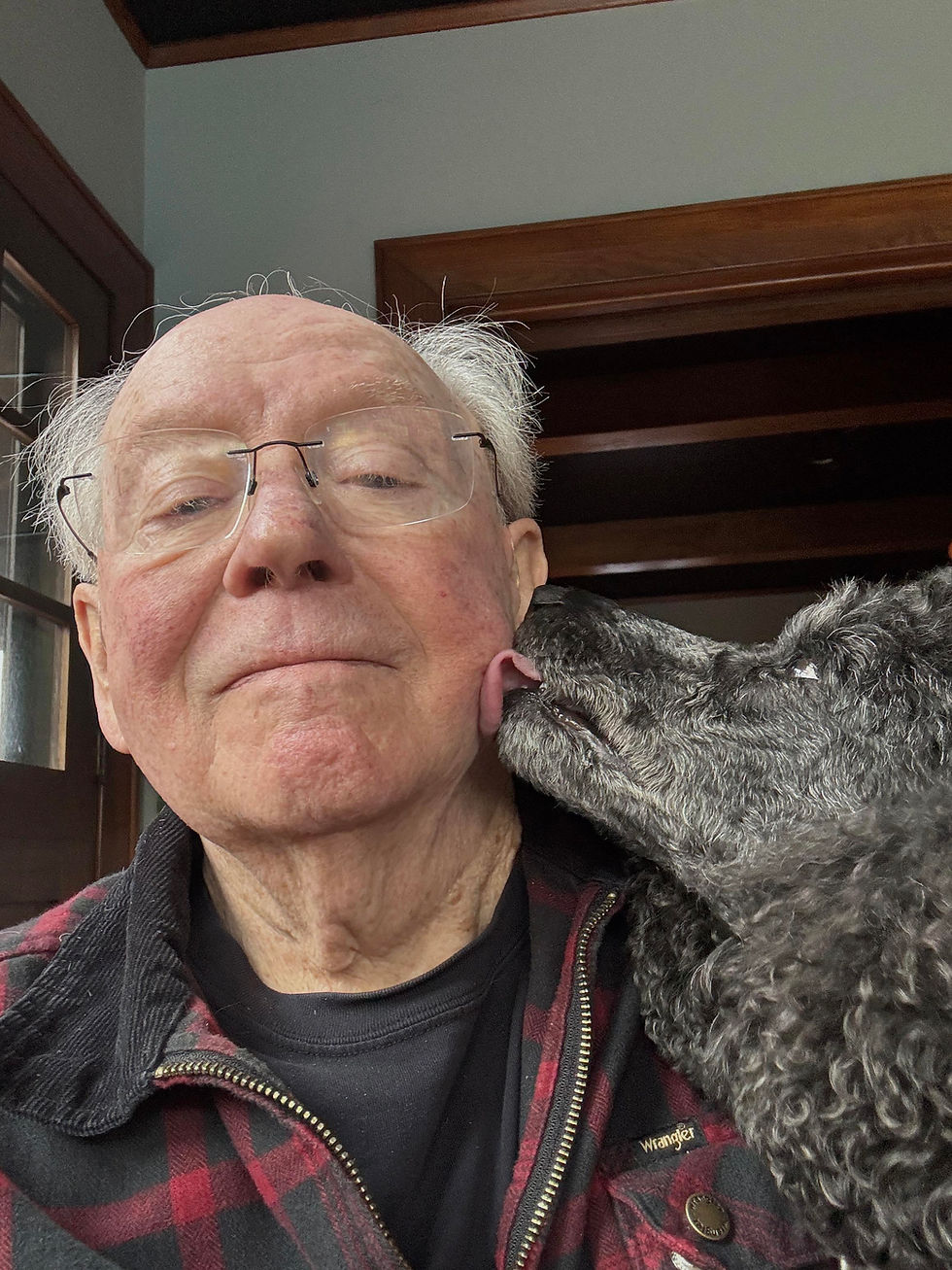Fear of the Ocean
- John Ash

- Aug 19, 2025
- 5 min read
Updated: Aug 20, 2025
At 8:15 a.m. on a fog-cloaked July morning, John crested the sand dune that separated the old Navy road from the patient, murmuring Pacific. The dune was exactly twenty feet high, though he’d never measured it. He simply knew. The ocean waited beyond it, rolling like an old machine trying to remember how to work. Somewhere in that pale blur, his son Harrison—Harry to the others—and a loose constellation of youth and firewood stood by a campfire flickering like a thought trying to stay alive.

The fog wasn’t fog, exactly. It was memory, heavy and slow-moving, reluctant to yield to the sun. John wore his red swim trunks and a Cal Poly Humboldt hoodie—its seams slightly damp from the last misting. He would enter the water today. Not to surf. Never that. He would play. Playing was permissible.
The kids made room on a driftwood log. Harry looked up from toasting a damp marshmallow. “Hey, Dad, you coming out with us?”
Everyone looked at John as if waiting for a jury verdict.
He tightened his shoulders, as if wind had passed through him, turned to ash, and whispered, “I can’t swim.”
His words settled like stones on the fire.
“I’m afraid of the ocean.”
Harry laughed, high-pitched and brief. “Dad, everybody swims. It’s... like breathing.” He exhaled demonstrably, proof of his own aquatic ease.
Jeanne, Harry’s girlfriend, leaned forward and smiled through a curtain of wet bangs. “Don’t worry, man. We’ve got you. It’s just water. Get in. We’ll save you if you get weird.”
John didn’t respond. Not verbally. Instead, he stood, nodded in a noncommittal way, and walked down the beach until the voices grew soft and then vanished into the fog-sand silence.
He lay on his towel—candy-striped like the awnings of forgotten seaside cafés—and closed his eyes. The waves became rhythmic, like breath through a sleeping mouth. The dampness of the sand beneath him seeped upward, curling into his spine like a secret.
And then—the shock of cold. A rogue tide slapped his bare feet, like a forgotten cousin announcing his arrival with a wet handshake. The fog peeled open. Sunlight burned the edge of the silver ocean.
He sat up. But it was not he who sat up.
“I” stood, detached from the towel, from the name John, from the idea of not knowing how to swim. I walked forward into the waves. The water whispered warnings, each frothy exhale repeating my name like a riddle—“John… John… don’t go…”
I spoke back. “Stop.”
At waist depth, I surrendered. A muscle in my foot clenched into a cramp that felt like a closing fist. Still, I lunged into the undertow. The water swallowed me like it knew me.
Then came the wall—massive, sentient, impossibly black. A hundred meters wide and rising.
And riding atop it—a parade of lifeguards in ceremonial formation. Twelve of them, straddling rubber beasts: a lime-green plesiosaur, a crimson duck with golden eyelashes, a seal balancing a disco ball. They wore golden gloves that shimmered in the gray light.
One, mounted on a translucent dinosaur, addressed me in bureaucratic tones. “We are certified. We have passed all tests. We assist thrashers—those who flail their egos rather than their limbs.”
I wondered—was I a thrasher?
“Are you drowning?” called a voice from below.
I turned. A woman on a glowing yellow dinosaur named Jane emerged from beneath the lip of the wave, towing a gray raft. Her bathing suit blazed red like a warning flare. She reached for me. “Breathe,” she commanded.
I didn’t.
She administered breath for me. Warm. Direct. Not at all unpleasant.
“I think I’ve died,” I whispered to her lips.
“No,” she said. “Not yet.”
The raft cradled me. Jane cradled my head. The fog curled like smoke above the wave crest. She invited me to enter the water again—not from the edge, but through a strange stitched hole in the raft itself. A square portal in the floor of the boat, like the trapdoor in a magician’s stage.
“Am I a rabbit?” I asked.
She didn’t laugh. “You’re just you.”
A life vest, colored like citrus and rose petals, inflated around me. It was too tight. I may have overinflated. Or she had. Perhaps she knew something about me I didn’t.
“I can teach you,” she said. “If you want.”
I wanted.
I pulled on the gloves—her gloves—golden and warm. They knew the language of water better than I ever had. I slipped over the raft’s side.
Underneath, the ocean was not water but something older. Time in fluid form. The gloves cut through it, sending up tiny suns that sparkled and danced like fish learning to fly.
Above me, the wave built again. The menagerie tightened formation. Somewhere in the sky, the moon had doubled in size. The wave hesitated—as if confused by its own purpose—then surged. I hesitated too long. The boat vanished. The world turned.
I tumbled.
Then surfaced, wrapped in a wetsuit I hadn’t worn. Warm, inexplicably redolent of campfires and memory. I turned, the beach lit now with improbable clarity. Harry and the others blurred at the shoreline like figures in a dream nearly forgotten.
Jane intercepted me again, this time without fanfare.
“I’m proud of you,” she said, and kissed me.
Not to save me.
Just to kiss.
A marching band on oversized float toys arrived, horns gleaming like sea beasts. Brassy notes skittered across the water, chased by drumbeats and flying fish.
Later, we roasted marshmallows.
Then I kissed her.
The fire hissed as damp driftwood popped. Fog curled around our ankles like curious cats.
Jane leaned back, the word LIFEGUARD glowing faintly in the firelight like a warning—or maybe a promise.
We didn’t speak for a while. Just watched the flames chew through salt-wet logs and listened to the ocean breathe.
Then, out of nowhere, she stood and walked toward the surf, red suit vivid against the gray.
“Come on,” she called.
“I don’t swim well,” I said, already following.
She waded in, no hesitation. I hesitated.
The cold grabbed my ankles like an old debt, but her silhouette beckoned—bright, upright, unafraid.
“Kicking’s wrong,” she said as I flailed past a small breaker. “You’re fighting the water. Let it lift you.”
I tried. My limbs wanted to remember, but they didn’t know how.
“Close your eyes.”
I did.
Her hand slid onto my back, not to push, not to hold—just to remind.
The current shifted. My chest rose. I let go of the urge to resist.
And then, something aligned.
I caught the rhythm—not of swimming, but of staying.
Jane smiled, her mouth soft with moonlight. “See?” she whispered. “You're not sinking. You're moving.”
And I was.
Not fast, not far. But forward.
We floated until the band was only memory. Until the fire was just a dot on the beach. Until my name was something I didn’t need to remember.
That night, I dreamed of swimming—not to escape, but to arrive.















Comments